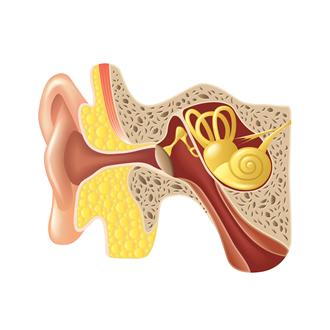
The eustachian tube is a narrow canal that runs from the throat to the middle ear, and it is responsible for regulating pressure within the middle ear. If you’ve ever yawned and felt your ears become “unplugged” then you’ve experienced the Eustachian tube at work. However, sometimes people can deal with eustachian tube dysfunction, which can affect the pressure in the ears. Those with eustachian tube dysfunction may experience:
- Pressure or fullness in the ears
- Muffled hearing
- Pain in the ears
- Ringing in the ears (known as tinnitus)
- Issues with balance
- A popping or clicking sensation in the ears
Sometimes these symptoms are exacerbated by altitude changes such as flying or riding in an elevator.
Children are often more at risk for developing Eustachian tube dysfunction because these tubes are shorter than they are in adults. This means that it’s easier for bacteria or fluid to get trapped within the middle ear. The good news is that these symptoms usually go away on their own and typically without treatment. There are things you can do such as chewing gum to help make the issue go away. If the problem persists then it’s time to see an otolaryngologist.
Once your ENT doctor has conducted a thorough examination of you or your child’s ears there are several approaches for alleviating the symptoms of eustachian tube dysfunction:
- If Eustachian tube dysfunction is due to an allergic reaction then your doctor may prescribe decongestants or antihistamines, which can reduce swelling and target the body’s response to the allergen.
- A minor procedure can be performed in which an otolaryngologist makes a small incision in the eardrum to remove the fluid that’s trapped in the middle ear. The eardrum will then heal in a couple of days.
- Sometimes implants are placed into the eardrums to help drain the fluid and to prevent fluid from building up. This is a recommended treatment for children who develop frequent ear infections due to eustachian tube dysfunction.
- A special balloon catheter procedure (similar to the one used to treat chronic sinusitis) can be directed into the nose and into the eustachian tube, where it opens up the tubes to help them drain properly.
Your ENT doctor can talk to you about the different options for helping you or your child deal with eustachian tube dysfunction. While this condition is often self-limiting and will usually go away on its own. If symptoms become severe or problematic then it’s time to see a qualified medical professional.
